人教版高中英语必修四 unit4 body language language points 课件 (共43张PPT)
文档属性
| 名称 | 人教版高中英语必修四 unit4 body language language points 课件 (共43张PPT) | 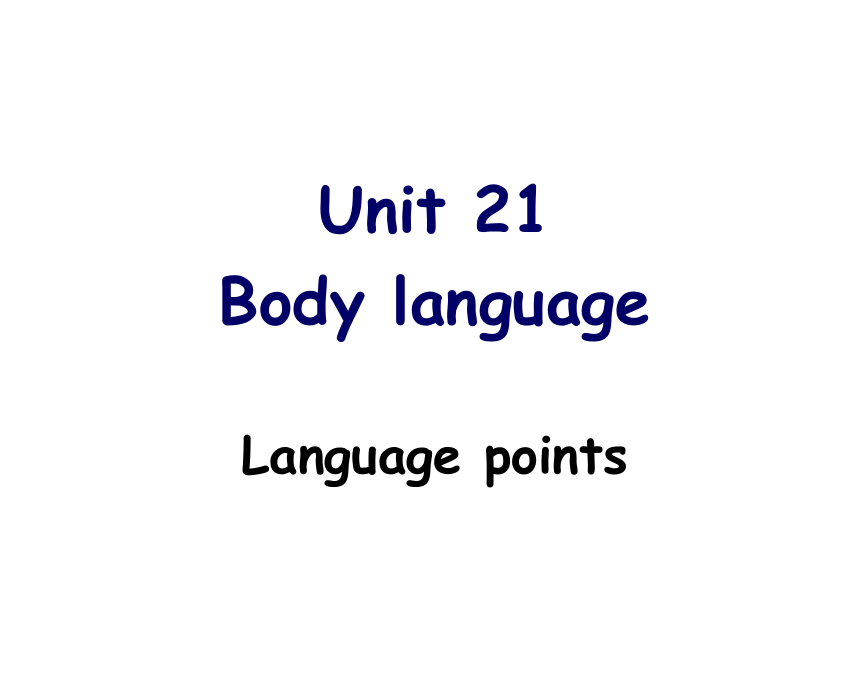 | |
| 格式 | zip | ||
| 文件大小 | 427.5KB | ||
| 资源类型 | 教案 | ||
| 版本资源 | 人教版(新课程标准) | ||
| 科目 | 英语 | ||
| 更新时间 | 2020-05-09 15:41:05 | ||
图片预览

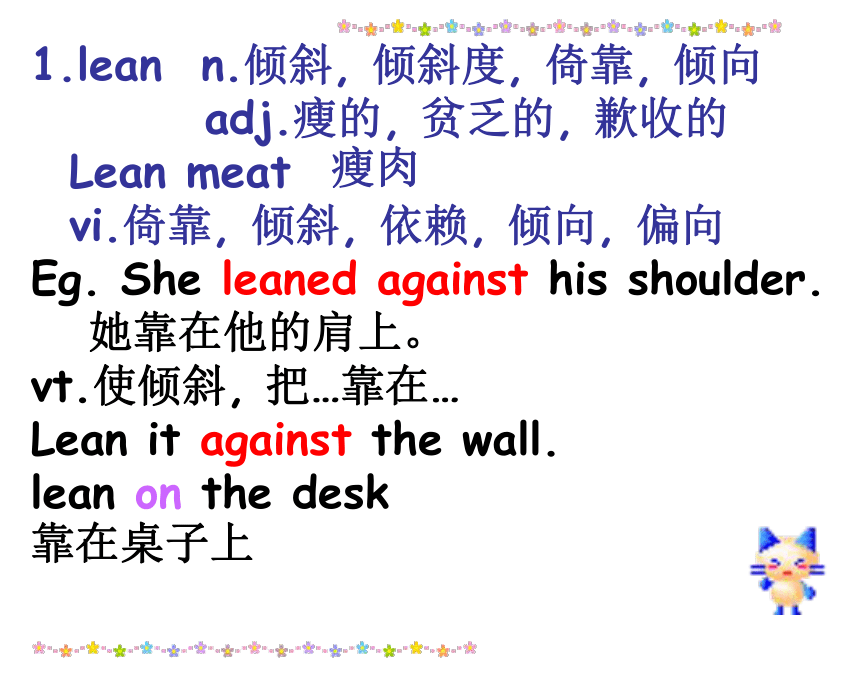
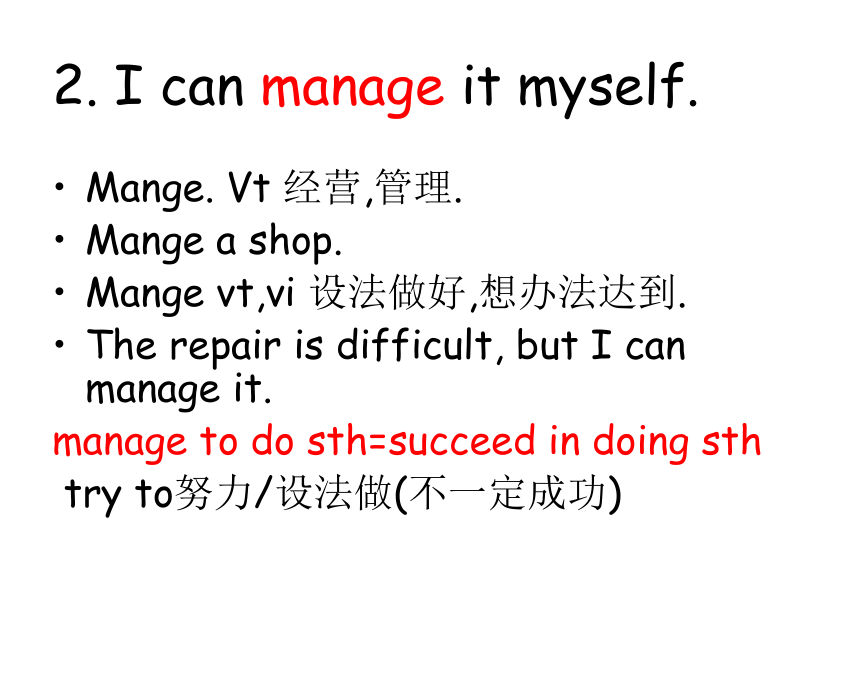
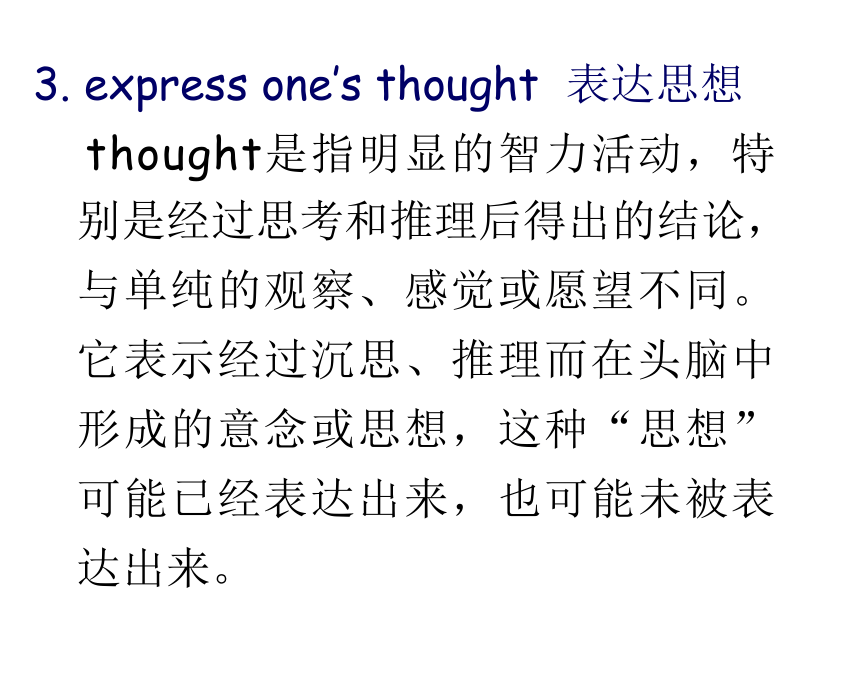
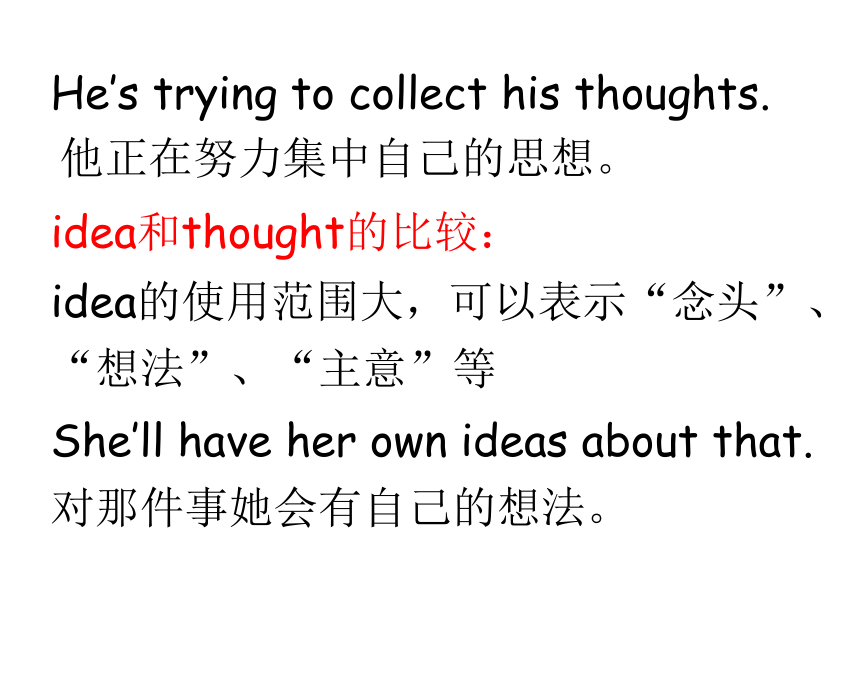
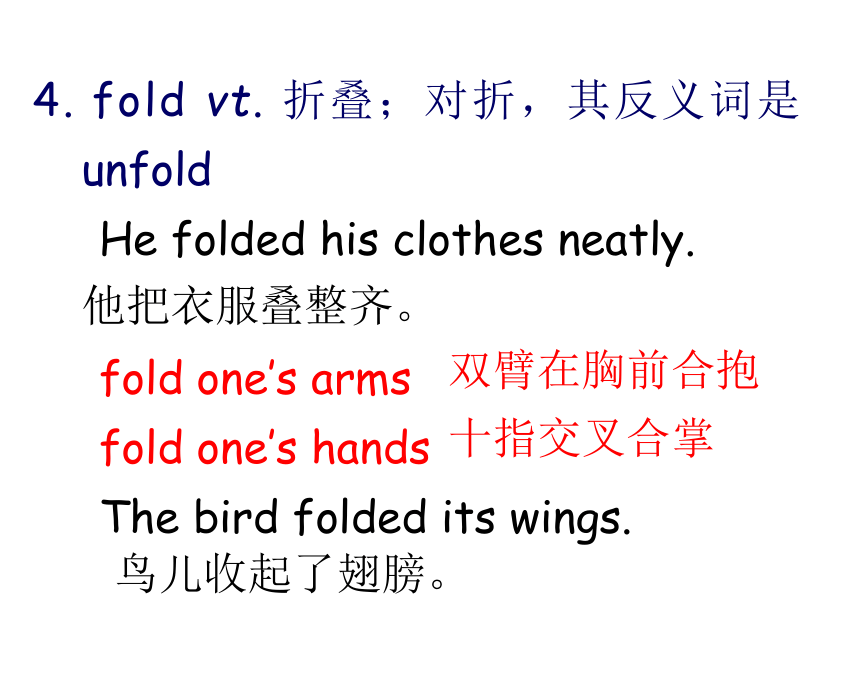
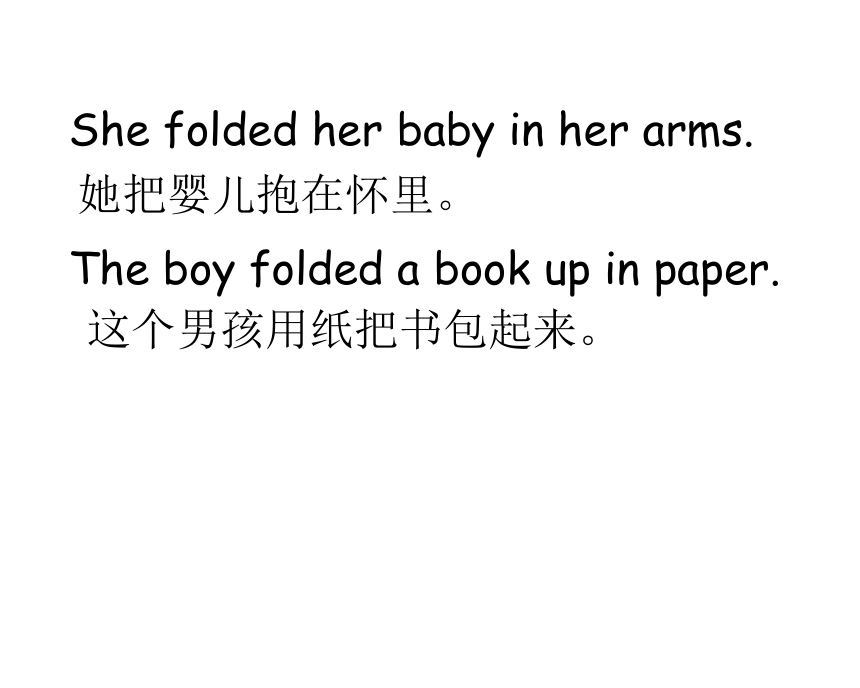
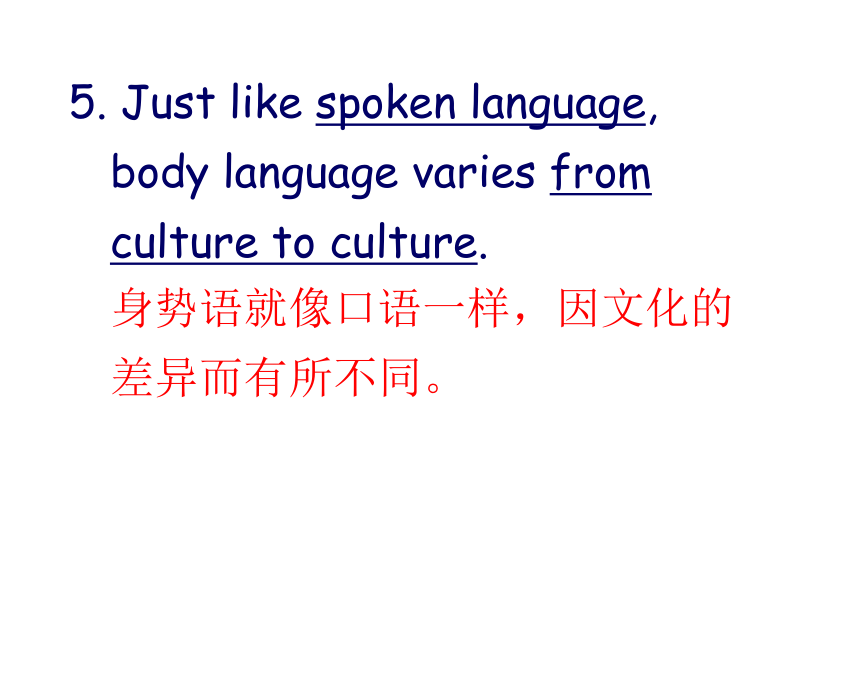
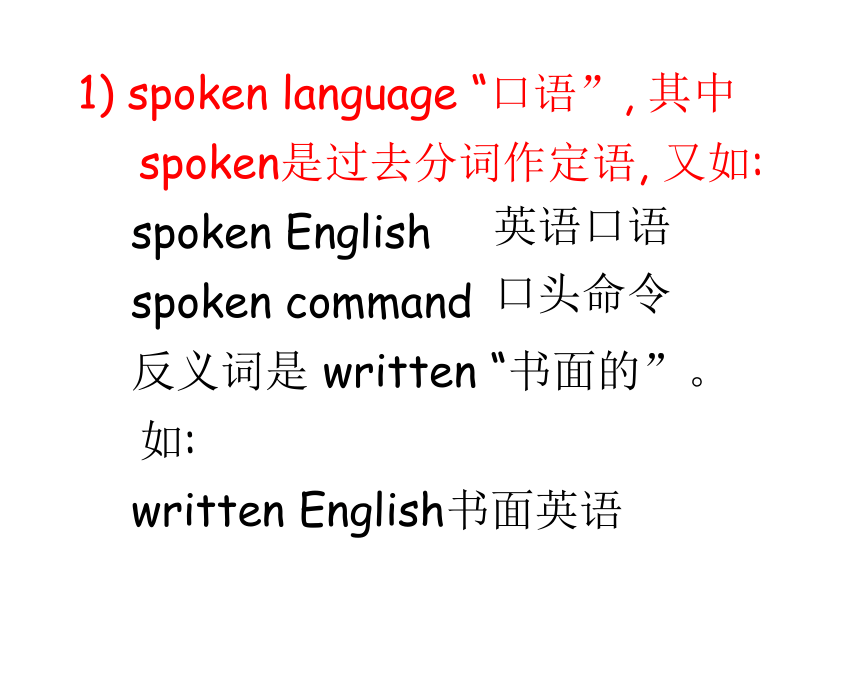
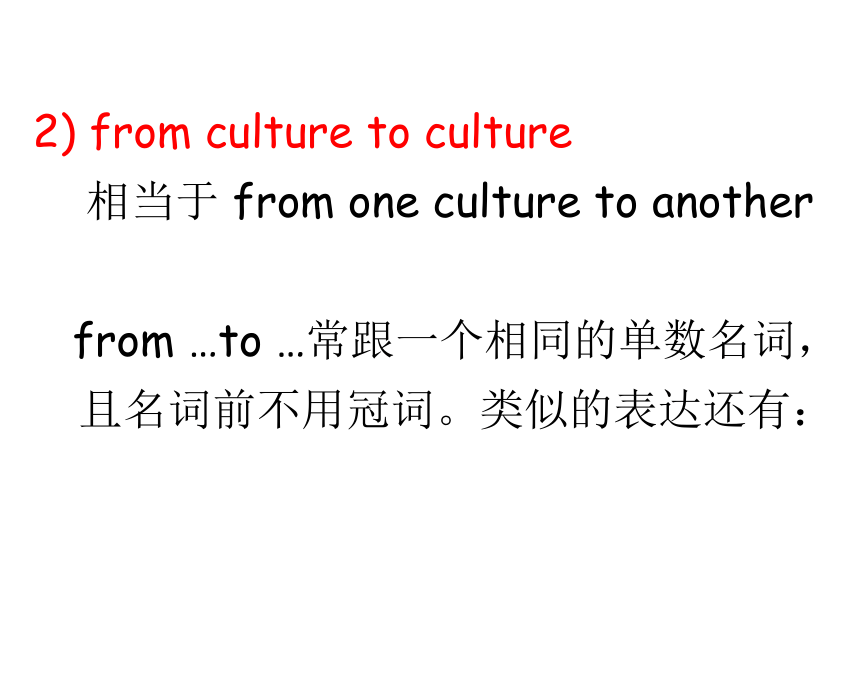
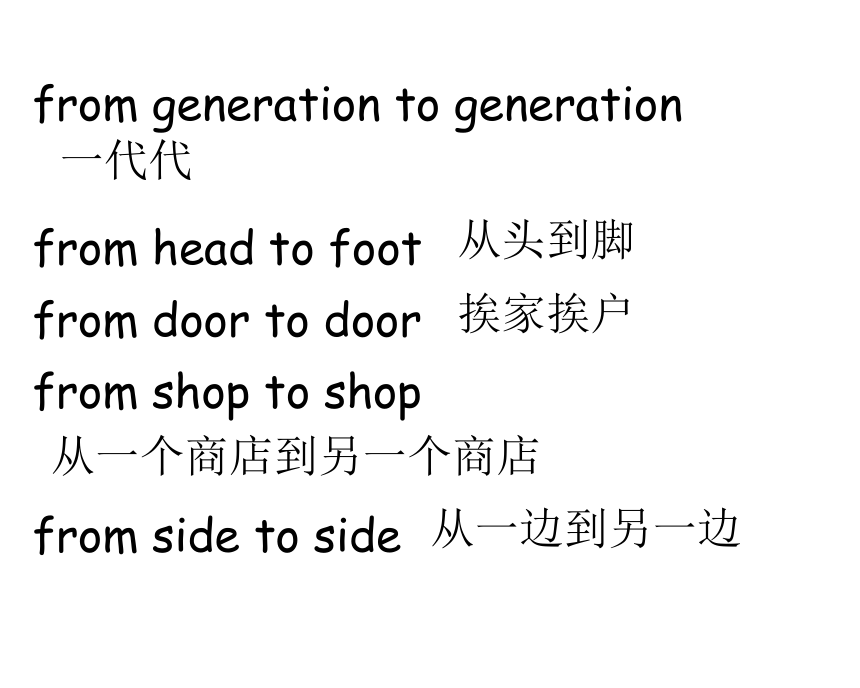
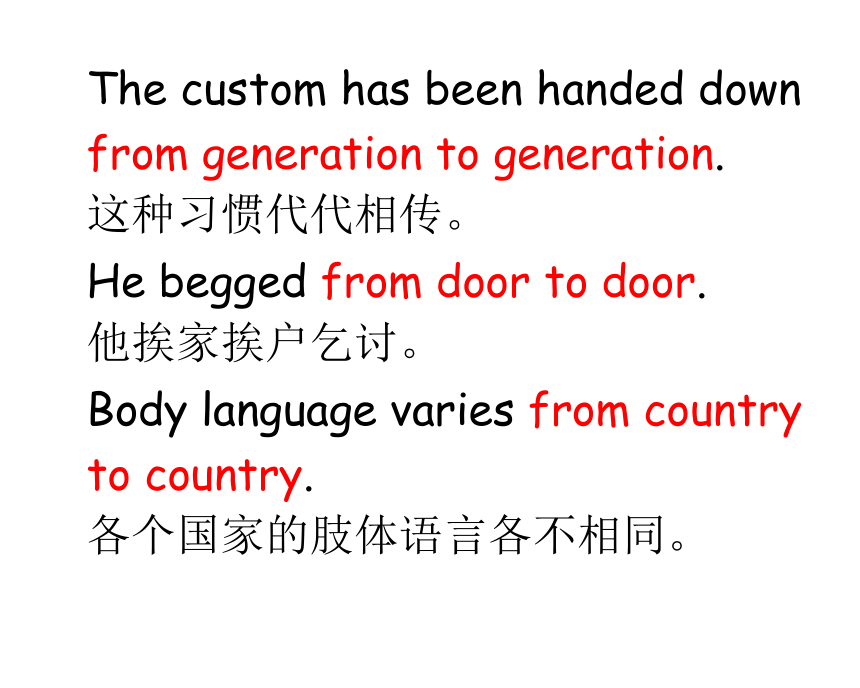
文档简介
(共43张PPT)
Unit 21
Body language
Language points
1.lean n.倾斜, 倾斜度, 倚靠, 倾向
adj.瘦的, 贫乏的, 歉收的
Lean meat
vi.倚靠, 倾斜, 依赖, 倾向, 偏向
Eg. She leaned against his shoulder.
她靠在他的肩上。
vt.使倾斜, 把…靠在…
Lean it against the wall.
lean on the desk
靠在桌子上
瘦肉
2. I can manage it myself.
Mange. Vt 经营,管理.
Mange a shop.
Mange vt,vi 设法做好,想办法达到.
The repair is difficult, but I can manage it.
manage to do sth=succeed in doing sth
try to努力/设法做(不一定成功)
3. express one’s thought 表达思想
thought是指明显的智力活动,特别是经过思考和推理后得出的结论,与单纯的观察、感觉或愿望不同。它表示经过沉思、推理而在头脑中形成的意念或思想,这种“思想”可能已经表达出来,也可能未被表达出来。
He’s trying to collect his thoughts.
idea和thought的比较:
idea的使用范围大,可以表示“念头”、“想法”、“主意”等
She’ll have her own ideas about that. 对那件事她会有自己的想法。
他正在努力集中自己的思想。
4. fold vt. 折叠;对折,其反义词是unfold
He folded his clothes neatly. 他把衣服叠整齐。
fold one’s arms
fold one’s hands
The bird folded its wings.
双臂在胸前合抱
十指交叉合掌
鸟儿收起了翅膀。
She folded her baby in her arms.
The boy folded a book up in paper.
她把婴儿抱在怀里。
这个男孩用纸把书包起来。
5. Just like spoken language, body language varies from culture to culture. 身势语就像口语一样,因文化的差异而有所不同。
1) spoken language “口语”, 其中 spoken是过去分词作定语, 又如:
spoken English
spoken command
反义词是 written “书面的”。如:
written English书面英语
英语口语
口头命令
2) from culture to culture
相当于 from one culture to another
from …to …常跟一个相同的单数名词,且名词前不用冠词。类似的表达还有:
from generation to generation
from head to foot
from door to door
from shop to shop
from side to side
一代代
从头到脚
挨家挨户
从一个商店到另一个商店
从一边到另一边
The custom has been handed down from generation to generation.
这种习惯代代相传。
He begged from door to door.
他挨家挨户乞讨。
Body language varies from country to country.
各个国家的肢体语言各不相同。
6. Making eye contact — looking directly into someone’s eyes — is in some countries a way to show that one is interested. 目光接触—直视对方—在某些国家能表明自己感兴趣。
(1) contact n. 接触;联系 (U)
词组:
be in contact with
和……接触,有联系
be out of contact with
和……失去联系
bring sb. into contact with
使……接触……
come into contact with
接触,碰上
lose contact with 和……失去联系
make contact with 和……接触,联系
We must keep in contact with them.
我们必须和他们保持联络。
(2) look into
1. 注视……的内部,往……里面看。 She looked into the room and saw nothing.
2. 调查,检查
The police are looking into the case.
警察正在调查这起案件。
look 的相关短语:
look out
= watch out, take care
look about
look after
look back
look down on
look for
当心,注意
四周环顾
照顾某人或某事
记起,回想
轻视
寻找
look forward to
look in
look through
look to
look up
look up to
期待,盼望
做简短的拜访
检查,审视
注意(改进), 依赖
好转;查阅
尊敬某人
用look的相关短语填空:
1. ________! There is danger ahead.
2. __________ you and decide if you like your position.
3. Try to ______ the word in the dictionary.
Look out
Look about
look up
4. The committee is __________ the cause of the accident.
5. Are you being well ___________.
6. I ______________ calling you.
7. We should _________our teachers.
looking into
looked after
look forward to
look up to
(3) directly &direct
二者都可以用作副词,一般来讲, direct表达的词意比较具体,通常指位置的直接移动和空间上的“直接”; directly表达的词意比较抽象,主要用于事物关系的直接影响,也可以表示位置的直接移动,还可指时间上的“立刻、马上”。如:
Please write direct to him.
请直接给他写信。
They are not directly affected.
他们没有受到直接影响。
7. crazy adj.
1) 发疯的
You are crazy to go out in such old weather. 在这么冷的天气出去你疯了。
It is crazy of you to buy the car at such a high price.(=You are crazy to buy the car at such a high price.) 花那么高的价钱去买这辆车,你真是疯了。
2) 热爱,狂热 be crazy about
He is crazy about drawing.
他热衷于画画。
8. as to
1) 至于,说到 (=as for)
As to me, I sat on his left hand.
说到我,我坐在他的左边。
2) 关于
There is no doubt as to their intention.
关于他们的意图是无可置疑的。
9. meet vt.
1) 迎接
I will meet you at the airport tomorrow.明天我会在机场接你。
2) 遇见
I often meet him in the park.
我经常在公园遇见他。
3) 满足
Can these meet their demands?
这些能满足他们的要求吗?
4) 见面,认识
I know his name, but we’ve never met.
我知道他的名字,但从未见过面。
5) 支付
Have we enough money with us to meet all expenses? 我们身上的钱够全部的费用吗?
meet with 遇到
make ends meet 使收支相抵
1)?遭遇 (不幸)
I often meet with some difficulties, but I could try to manage them.
我经常遇到一些困难,但我能够尽力应付这些困难。
2) 偶尔碰到
I met with an old friend at a dinner party. 我在一次宴会上偶然遇到我的一位老朋友。
3) 得到(赞成等)
They met with a warm welcome.
他们受到了热烈欢迎。
10. as if
as if/as though 是从属连词,意义用法相同,用来引导方式状语从句,意为“好像”。
1) as if / as though 引出的方式状语从句,如果是事实或者可能性较大,多用陈述语气,常和look, seem, taste, smell, sound 等词搭配。
It looks as if it is going to rain.
看起来好象要下雨。
It seems as if the boy has lost his way.
那个男孩好象迷路了。
2)?as if / as though 引出的方式状语从句所表示的情况若不是事实,而是主观上的想象或夸大性比喻,通常用虚拟语气。如:
The young man with long hair looks as if he were a woman. 这位留着长发的男青年看上去好象是个女的。
He walks as if he were drunk. 他走路的样子好象是喝醉了。
11. get through
1) 表示“接通电话”
I tried to telephone you but I couldn’t get through. 我要打电话给你,但打不通。
2) 表示“完成(工作)”
Have you got through your homework?
你做完作业了吗?
3) 表示“通过(考试)”
They have all got through the examination.
4) 表示 “把钱(花光)”
He got through all the money in a week.
他们全通过了考试。
他一周内花光了所有的钱。
5)?表示“成功地熬过”
I can’t think how they will get through the time. 我不能想象这段时间他们怎样熬过去。
12. tear down
1) 拆毁,拆掉
They are tearing down the old building in order to build a new one.
为了建新房子,他们正在拆掉老房子。
2) 撕下来,扯下来
He tore down the advertisement.
他撕下了通知。
3) 拆卸开
Tear down the engine.
拆卸开发动机。
tear sth. in half / two
撕成两半
=tear sth. into halves
tear sth into pieces
撕成碎片
tear sth up
撕碎,撕毁
He couldn’t tear himself away from the book.
他舍不得放下那本书。
13. And if we are feeling down or lonely, there is nothing better than to see the smiling face of a good friend. 如果我们感到沮丧或孤独,没有什能比看到好朋友的笑脸更好的了。
1) down adj.气馁的,沮丧的,虚弱的 如:
I felt down about her leaving.
我对她的离开感到闷闷不乐。
He was very down when he told us that.
他告诉我们这事时,心情很沮丧。
He looks down. I think he must be tired.
他显得很虚弱,我想他准是太劳累了。
2) There is nothing better than to do sth.
没有比做某事再好的了/没有什么能强过……
There is nothing better than to have a hot bath after a whole day’s work.
没有什么比工作一天后洗个热水澡更好的了。
There is nothing better than to help yourself to a cold drink in hot summer. 没有什么比在炎热的夏天喝杯冷饮更好的了。
Unit 21
Body language
Language points
1.lean n.倾斜, 倾斜度, 倚靠, 倾向
adj.瘦的, 贫乏的, 歉收的
Lean meat
vi.倚靠, 倾斜, 依赖, 倾向, 偏向
Eg. She leaned against his shoulder.
她靠在他的肩上。
vt.使倾斜, 把…靠在…
Lean it against the wall.
lean on the desk
靠在桌子上
瘦肉
2. I can manage it myself.
Mange. Vt 经营,管理.
Mange a shop.
Mange vt,vi 设法做好,想办法达到.
The repair is difficult, but I can manage it.
manage to do sth=succeed in doing sth
try to努力/设法做(不一定成功)
3. express one’s thought 表达思想
thought是指明显的智力活动,特别是经过思考和推理后得出的结论,与单纯的观察、感觉或愿望不同。它表示经过沉思、推理而在头脑中形成的意念或思想,这种“思想”可能已经表达出来,也可能未被表达出来。
He’s trying to collect his thoughts.
idea和thought的比较:
idea的使用范围大,可以表示“念头”、“想法”、“主意”等
She’ll have her own ideas about that. 对那件事她会有自己的想法。
他正在努力集中自己的思想。
4. fold vt. 折叠;对折,其反义词是unfold
He folded his clothes neatly. 他把衣服叠整齐。
fold one’s arms
fold one’s hands
The bird folded its wings.
双臂在胸前合抱
十指交叉合掌
鸟儿收起了翅膀。
She folded her baby in her arms.
The boy folded a book up in paper.
她把婴儿抱在怀里。
这个男孩用纸把书包起来。
5. Just like spoken language, body language varies from culture to culture. 身势语就像口语一样,因文化的差异而有所不同。
1) spoken language “口语”, 其中 spoken是过去分词作定语, 又如:
spoken English
spoken command
反义词是 written “书面的”。如:
written English书面英语
英语口语
口头命令
2) from culture to culture
相当于 from one culture to another
from …to …常跟一个相同的单数名词,且名词前不用冠词。类似的表达还有:
from generation to generation
from head to foot
from door to door
from shop to shop
from side to side
一代代
从头到脚
挨家挨户
从一个商店到另一个商店
从一边到另一边
The custom has been handed down from generation to generation.
这种习惯代代相传。
He begged from door to door.
他挨家挨户乞讨。
Body language varies from country to country.
各个国家的肢体语言各不相同。
6. Making eye contact — looking directly into someone’s eyes — is in some countries a way to show that one is interested. 目光接触—直视对方—在某些国家能表明自己感兴趣。
(1) contact n. 接触;联系 (U)
词组:
be in contact with
和……接触,有联系
be out of contact with
和……失去联系
bring sb. into contact with
使……接触……
come into contact with
接触,碰上
lose contact with 和……失去联系
make contact with 和……接触,联系
We must keep in contact with them.
我们必须和他们保持联络。
(2) look into
1. 注视……的内部,往……里面看。 She looked into the room and saw nothing.
2. 调查,检查
The police are looking into the case.
警察正在调查这起案件。
look 的相关短语:
look out
= watch out, take care
look about
look after
look back
look down on
look for
当心,注意
四周环顾
照顾某人或某事
记起,回想
轻视
寻找
look forward to
look in
look through
look to
look up
look up to
期待,盼望
做简短的拜访
检查,审视
注意(改进), 依赖
好转;查阅
尊敬某人
用look的相关短语填空:
1. ________! There is danger ahead.
2. __________ you and decide if you like your position.
3. Try to ______ the word in the dictionary.
Look out
Look about
look up
4. The committee is __________ the cause of the accident.
5. Are you being well ___________.
6. I ______________ calling you.
7. We should _________our teachers.
looking into
looked after
look forward to
look up to
(3) directly &direct
二者都可以用作副词,一般来讲, direct表达的词意比较具体,通常指位置的直接移动和空间上的“直接”; directly表达的词意比较抽象,主要用于事物关系的直接影响,也可以表示位置的直接移动,还可指时间上的“立刻、马上”。如:
Please write direct to him.
请直接给他写信。
They are not directly affected.
他们没有受到直接影响。
7. crazy adj.
1) 发疯的
You are crazy to go out in such old weather. 在这么冷的天气出去你疯了。
It is crazy of you to buy the car at such a high price.(=You are crazy to buy the car at such a high price.) 花那么高的价钱去买这辆车,你真是疯了。
2) 热爱,狂热 be crazy about
He is crazy about drawing.
他热衷于画画。
8. as to
1) 至于,说到 (=as for)
As to me, I sat on his left hand.
说到我,我坐在他的左边。
2) 关于
There is no doubt as to their intention.
关于他们的意图是无可置疑的。
9. meet vt.
1) 迎接
I will meet you at the airport tomorrow.明天我会在机场接你。
2) 遇见
I often meet him in the park.
我经常在公园遇见他。
3) 满足
Can these meet their demands?
这些能满足他们的要求吗?
4) 见面,认识
I know his name, but we’ve never met.
我知道他的名字,但从未见过面。
5) 支付
Have we enough money with us to meet all expenses? 我们身上的钱够全部的费用吗?
meet with 遇到
make ends meet 使收支相抵
1)?遭遇 (不幸)
I often meet with some difficulties, but I could try to manage them.
我经常遇到一些困难,但我能够尽力应付这些困难。
2) 偶尔碰到
I met with an old friend at a dinner party. 我在一次宴会上偶然遇到我的一位老朋友。
3) 得到(赞成等)
They met with a warm welcome.
他们受到了热烈欢迎。
10. as if
as if/as though 是从属连词,意义用法相同,用来引导方式状语从句,意为“好像”。
1) as if / as though 引出的方式状语从句,如果是事实或者可能性较大,多用陈述语气,常和look, seem, taste, smell, sound 等词搭配。
It looks as if it is going to rain.
看起来好象要下雨。
It seems as if the boy has lost his way.
那个男孩好象迷路了。
2)?as if / as though 引出的方式状语从句所表示的情况若不是事实,而是主观上的想象或夸大性比喻,通常用虚拟语气。如:
The young man with long hair looks as if he were a woman. 这位留着长发的男青年看上去好象是个女的。
He walks as if he were drunk. 他走路的样子好象是喝醉了。
11. get through
1) 表示“接通电话”
I tried to telephone you but I couldn’t get through. 我要打电话给你,但打不通。
2) 表示“完成(工作)”
Have you got through your homework?
你做完作业了吗?
3) 表示“通过(考试)”
They have all got through the examination.
4) 表示 “把钱(花光)”
He got through all the money in a week.
他们全通过了考试。
他一周内花光了所有的钱。
5)?表示“成功地熬过”
I can’t think how they will get through the time. 我不能想象这段时间他们怎样熬过去。
12. tear down
1) 拆毁,拆掉
They are tearing down the old building in order to build a new one.
为了建新房子,他们正在拆掉老房子。
2) 撕下来,扯下来
He tore down the advertisement.
他撕下了通知。
3) 拆卸开
Tear down the engine.
拆卸开发动机。
tear sth. in half / two
撕成两半
=tear sth. into halves
tear sth into pieces
撕成碎片
tear sth up
撕碎,撕毁
He couldn’t tear himself away from the book.
他舍不得放下那本书。
13. And if we are feeling down or lonely, there is nothing better than to see the smiling face of a good friend. 如果我们感到沮丧或孤独,没有什能比看到好朋友的笑脸更好的了。
1) down adj.气馁的,沮丧的,虚弱的 如:
I felt down about her leaving.
我对她的离开感到闷闷不乐。
He was very down when he told us that.
他告诉我们这事时,心情很沮丧。
He looks down. I think he must be tired.
他显得很虚弱,我想他准是太劳累了。
2) There is nothing better than to do sth.
没有比做某事再好的了/没有什么能强过……
There is nothing better than to have a hot bath after a whole day’s work.
没有什么比工作一天后洗个热水澡更好的了。
There is nothing better than to help yourself to a cold drink in hot summer. 没有什么比在炎热的夏天喝杯冷饮更好的了。
同课章节目录
